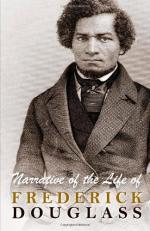|
|
The Narrative of the Life of Frederick Douglass Chapter 6
Mrs. Sophia Auld has never been a slaveholder. She is unlike any other white woman Douglass has ever known; she treats him like a human being. But soon, the menacing effects of slavery overcome her once gentle disposition.
"But, alas! this kind heart had but a short time to remain such. The fatal poison of irresponsible power was already in her hands, and soon commenced its infernal work. That cheerful eye, under the influence of slavery, soon became red with rage; that voice, made all of sweet accord, changed to one of harsh and horrid discord; and that angelic face gave place to that of a demon." Chapter 6, pp. 77-78
Topic Tracking: Dehumanization 5
This change of character is a result of attempting to teach Douglass how to read. When her husband finds out, he rebukes her severely, telling her that "'If you give a nigger an inch, he will take an ell. A nigger should know nothing but to obey his master-to do as he is told to do.'" Chapter 6, pg. 78 He warns his wife that learning to read will be harmful to a slave because it would make him "discontented and unhappy." Douglass takes these warnings as a personal challenge to learn to read at whatever cost. He regards this knowledge as the pathway from slavery to freedom and he acknowledges the aid of both Mrs. Auld's initial teaching as well as Mr. Auld's adamant condemnation of it.
There is a noticeable difference between the slavery of the city and that of the country. In Baltimore, slaveholders share a common sense of decency in their treatment of slaves. Slaves are seldom beaten and they are given enough to eat. There are, however, some exceptions. Douglass tells of two slaves, Henrietta and Mary, who are constantly whipped and poorly fed. The mistress of the house keeps a cowskin near her that she uses unceasingly on the poor girls. Mary is so often mistreated that she is known as "pecked" rather than by her name.




